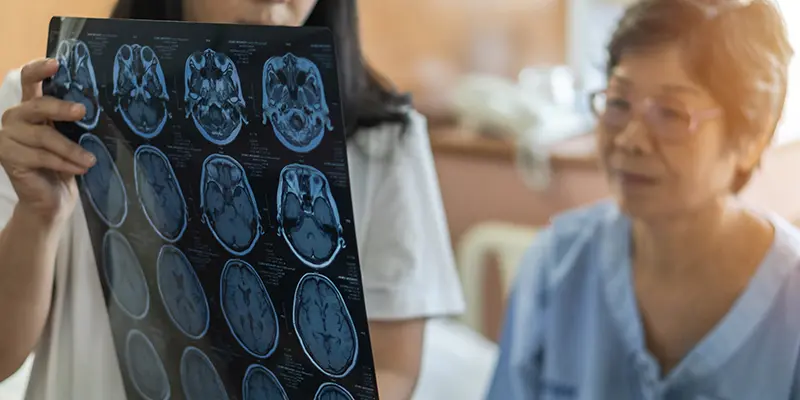
At Amen Clinics, our clinical practice and brain imaging work have led us to 12 core principles that underlie everything we do. They provide the foundation for the work we do with people suffering from a range of issues, as well as those looking to optimize their brains. These principles are incredibly simple, but don’t let that fool you. They are extremely powerful and can change your life.
Principle #1. Your brain is involved in everything you do.
How you think, how you feel, how you act, and how well you get along with other people has to do with the moment-by-moment functioning of your brain. After quarantining with family during the coronavirus pandemic, you probably have a sense of which family members have a healthy brain and which ones could have a better brain.
Principle #2. When your brain works right, you work right. When your brain is troubled, you have trouble in your life.
When your brain is healthy, you’re happier, physically healthier (because you make better decisions over a long period of time), wealthier (also because you make better decisions), and more successful overall. When your brain is not healthy, for whatever reason (a number of concussions from playing sports, a bad diet, a family history of bipolar disorder, etc.), you’re sadder, sicker, and less successful. It’s the whole idea behind the book The End of Mental Illness—these are not mental illnesses they are brain health issues that steal your mind.
Principle #3. Your brain is the most complicated organ in the universe.
Your brain weighs about 3 pounds and has about 100 billion neurons (nerve cells) and more connections than there are stars in the universe. Your brain accounts for only 2% of your body’s weight, yet it uses 20% to 30% of the calories you consume, so the food you eat really matters. And it uses about 20% of the oxygen and blood flow in your body, so anything that damages your heart or blood vessels ultimately damages your brain.
Principle #4. Your brain is incredibly soft—about the consistency of soft butter—and it’s housed in a really hard skull with multiple sharp bony ridges, making it easily injured.
Mild traumatic brain injuries (TBIs) ruin people’s lives, and nobody knows about it because most psychiatrists never look at the brain. Undiagnosed brain injuries are a major cause of suicide, homicide, incarceration, depression, panic attacks, ADD/ADHD, and learning problems.
If you’ve had a head injury and you find that you have lasting mood instability, irritability, temper problems, memory problems, learning problems, or mood problems, somebody should look at your brain.
Principle #5. Your brain has needs that must be met in order to work at optimal efficiency.
The requirements for optimal brain function include:
- Healthy blood flow (to deliver oxygen, vitamins, and essential minerals to the brain)
- Proper hydration
- Physical and mental exercise
- Stimulation (new learning)
- Fuel (aka healthy food)
- Hormones
- A strong (but not too strong) immune system
- An efficient waste management system to detoxify your body
- Adequate sleep
- Meaning and purpose in your life
- Being socially connected to other brains (especially important during the pandemic when people are sheltering at home. We need to lose the term “social” distancing. We need “physical” distancing, but more than ever, we need to be socially connected.)
Principle #6. Many things hurt the brain.
In The End of Mental Illness, you’ll find a mnemonic—BRIGHT MINDS—to help you remember the things that hurt the brain. The same things that increase the risk of death from COVID-19 also raise mental health risks—hypertension (blood flow problems), aging, inflammation, genetics, head trauma, toxins, mind-storms, immunity issues and infections, neurohormone problems, diabesity (as your weight goes up the physical functioning of your brain goes down), and sleep problems.
Principle #7. Many things help the brain.
As you go through your day, ask yourself, “Is this good for my brain or bad for it?” If you love yourself, you’re going to choose what’s good for your brain.
Principle #8. Like an orchestra, all parts of your brain need to be working well together to make you the best that you can be. Certain brain systems tend to do specific things.
For example:
- Prefrontal cortex (PFC)—language, focus, forethought, judgment, empathy, impulse control, learning from mistakes. When you hurt this area, you damage your decision-making, which ultimately damages everything in your life.
- Amygdala in the temporal lobes—involved with signaling fear, emotional reactions, and anxiety. People are saying that we’re having a global amygdala pandemic where fear is rampant.
Principle #9. Understanding your brain helps you know how to fix it.
For example, if you have low frontal lobe activity, you need clear goals. Write out your goals and then ask yourself, “Does my behavior fit what I want?”
Principle #10. All psychiatric “illnesses” are not single or simple disorders; they all have multiple types that require their own treatments.
Taking a one-size-fits-all approach to treatment invites repeated failure and frustration. Amen Clinics has identified:
- 7 types of anxiety and depression
- 7 types of ADD
- 6 types of addicts
- 5 types of overeaters
You can learn if you tend to be spontaneous (impulsive), persistent (compulsive), sensitive (sad), or cautious (anxious), or a combination of these. And you can learn which supplements will help balance your brain type.
Principle #11. The amount of “brain reserve” you have can help you handle life’s stresses or make you more vulnerable to them.
Brain reserve is the extra cushion of brain function you have to help you deal with the stressors life throws at you—like a pandemic. It’s like immune reserve. If you have a very strong, healthy immune system and you’re exposed to COVID-19, you can handle it. But if you have a weak immune system, it can take you out. It’s the same with the brain.
Principle #12. Looking at the brain changes everything.
The most important lesson from imaging is that you are not stuck with the brain you have, you can make it better. This is perhaps the most exciting and hopeful lesson of all. We all need to work hard to improve how our brains function, because with a better brain, always comes a better life and better mental health. Your brain can be better tomorrow if you begin doing the right things today. Follow these 3 steps:
- Fall in love with your brain and develop brain envy.
- Avoid anything that hurts your brain.
- Do things that help your brain.
You can find out more about the 12 principles and how they relate to brain health and mental illness in Daniel G. Amen, MD’s book The End of Mental Illness, or in this video on the topic.
Depression, anxiety, panic attacks, and other mental health issues can’t wait. During these uncertain times, your mental well-being is more important than ever, and waiting to get treatment until the pandemic is over is likely to make your symptoms worsen over time.
At Amen Clinics, we’re here for you. We offer mental telehealth, remote clinical evaluations, and video therapy for adults, children, and couples, as well as in-clinic brain scanning to help our patients. Find out more by speaking to a specialist today at 888-288-9834. If all our specialists are busy helping others, you can also schedule a time to talk.





No Comments »
No comments yet.
RSS feed for comments on this post.
Leave a comment